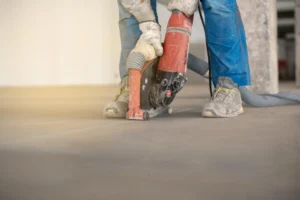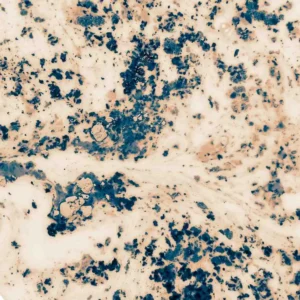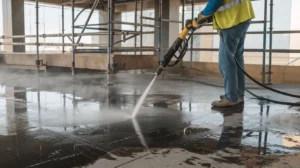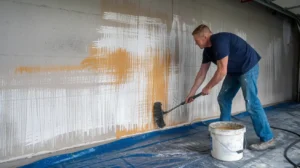Granite countertops are a popular choice in kitchens due to their durability, elegance, and natural beauty. However, many homeowners wonder, can you put hot pots on granite? While granite is known for its heat resistance, it’s essential to understand how it reacts to extreme temperatures and what precautions you should take to maintain its longevity.
This article will guide you through everything you need to know about granite and heat, including best practices for protecting your countertop from potential damage.

Understanding Granite’s Heat Resistance
Granite is an igneous rock, formed from the cooling and solidification of magma. This natural stone is incredibly strong and resistant to many forms of damage, including high temperatures.
Granite countertops can typically withstand temperatures up to 480°F (250°C), making them one of the more heat-resistant countertop materials available. The dense composition of granite means it can handle the occasional placement of hot pots or pans, but that doesn’t mean it’s immune to heat-related damage.
Despite granite’s impressive heat resistance, extreme heat can still affect its appearance and durability if not managed properly. It’s crucial to follow best practices to ensure the longevity of your granite countertops, even though they are highly resistant to heat.
What Happens When You Place Hot Pots on Granite?
When you put hot pots or pans directly on granite, the heat transfers from the cookware to the stone. While granite is capable of withstanding high temperatures, repeated exposure to intense heat can cause damage over time.
Placing hot items, such as pots and pans, on the same spot can create subtle heat marks or discoloration. Although these marks might not appear immediately, they can become more noticeable with repeated occurrences. Another issue that can arise is the weakening of the sealant applied to granite countertops.
Sealants are commonly used to protect natural stones like granite from stains and moisture. When you put hot pans on granite repeatedly, the high heat can degrade the sealant, leaving your countertop more vulnerable to other forms of damage, such as stains and scratches.
The Risk of Thermal Shock
While granite is resistant to heat, it’s not entirely immune to thermal shock. Thermal shock occurs when there is a sudden change in temperature, causing the material to crack or fracture.
For example, if you place a very hot pan on a granite surface that’s cold, the rapid temperature change could lead to a crack. Although granite is tough, it is still susceptible to this kind of damage under extreme temperature conditions.
Thermal shock is not common, but it’s a risk to be aware of, especially in colder climates where countertops may naturally cool down more than usual. Even though granite has a high tolerance for heat, sudden and extreme temperature fluctuations could cause cracks to develop.
Best Practices to Protect Granite from Heat
To avoid the risk of damaging your granite countertops, it’s wise to adopt some simple precautions:
Use Hot Pads or Trivets: Always place a hot pad or trivet under hot pots and pans before placing them on the granite. This prevents the direct transfer of extreme heat to the surface, protecting both the stone and the sealant.
Rotate Placement: Avoid placing hot items on the same spot repeatedly. Rotating where you set your hot pans can help distribute any potential heat damage.
Avoid Extreme Temperature Changes: Try to avoid putting extremely hot items on very cold granite surfaces. Let your granite countertop adjust to room temperature before exposing it to high heat.
By following these practices, you can extend the life of your granite countertops and ensure they remain beautiful for years to come.
The Role of Sealing in Heat Protection
Sealing granite countertops is a common practice that adds an extra layer of protection against stains and moisture. However, sealing also plays a role in heat protection. Sealants act as a barrier, preventing heat from penetrating too deeply into the stone. Over time, though, the sealant can wear down, especially if exposed to high temperatures regularly.
To ensure your granite remains protected, it’s important to reseal your countertops as recommended by the manufacturer—usually every 1-2 years. A high-quality sealant will also help protect the granite from moisture and other forms of damage, making your countertop more resistant to heat.
Common Myths About Granite and Heat
There are several myths surrounding granite’s heat resistance:
Granite is completely heatproof: While granite is heat resistant, it is not heatproof. Consistent exposure to extreme temperatures can still cause damage, especially if the countertop isn’t properly sealed or maintained.
Granite can’t crack from heat: While granite is highly durable, thermal shock can cause it to crack, particularly if subjected to rapid temperature changes.
You don’t need to use trivets or pads: Although granite can handle heat, using trivets or hot pads is a smart precaution to prevent long-term damage.
Understanding the truth behind these myths will help you care for your granite countertops more effectively.
Stone Sealer & Restoration Can Help You Find the Right Granite Countertop for Your Kitchen
If you’re considering granite countertops for your kitchen, Stone Sealer & Restoration can guide you in selecting the best option to suit your needs. We specialize in providing top-quality granite and can advise you on how to maintain your countertops to keep them looking new. Whether you’re curious about the heat resistance of granite or need professional sealing services, we’re here to help.
Our team understands the importance of durability in the kitchen, and we can ensure your granite countertops are installed and protected to handle the demands of daily cooking, including exposure to high temperatures. Contact us today to explore your options for granite countertops and expert sealing services.
FAQs
Can granite withstand heat?
Yes, granite is resistant to heat and can typically withstand temperatures up to 480°F (250°C). However, it’s best to use hot pads or trivets to avoid potential damage over time.
Does heat damage granite?
Heat can damage granite if hot items are placed on the same spot repeatedly. This can cause discoloration or weaken the sealant, making the surface more susceptible to other types of damage.
At what temperature does granite crack?
Granite can crack if exposed to rapid temperature changes, such as placing a hot pot on a cold surface. While granite is resistant to heat, extreme temperature fluctuations can lead to thermal shock and cracks.
Does granite crack easily?
Granite does not crack easily under normal circumstances. However, it can crack from thermal shock or if subjected to sudden and extreme temperature changes.
How to protect a countertop from a hot pan?
To protect your granite countertop, always use hot pads or trivets before placing hot pans on the surface. Avoid putting hot items directly on the granite, and reseal the countertop regularly to maintain its durability.





